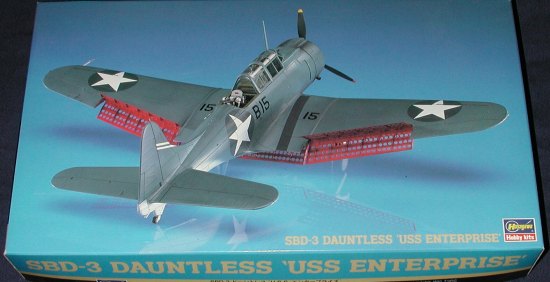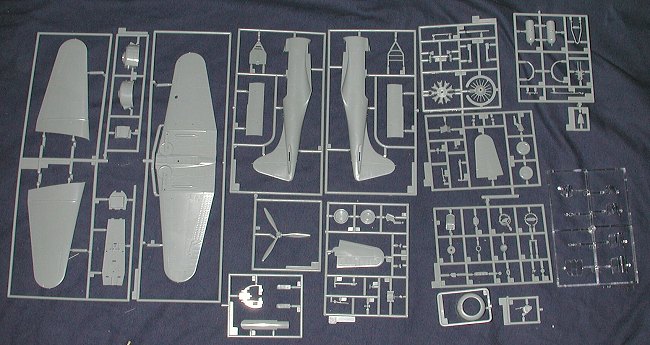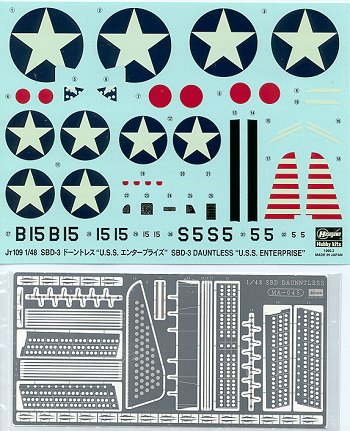
|
KIT: |
Hasegawa 1/48 SBD-3 Dauntless |
|
KIT # |
09169 (JT 109) |
|
PRICE: |
$ |
|
DECALS: |
Two aircraft |
|
REVIEWER: |
|
|
NOTES: |
Includes photo-etched dive brakes |

|
HISTORY |
In the Guadalcanal Campaign the Dauntless - operating from US carriers and from Henderson Field on the island of Guadalcanal itself - took a huge toll of Japanese shipping. SBDs sank the carrier Ryujo in the battle of the Eastern Solomons, and damaged three other carriers in the battles of Eastern Solomons and Santa Cruz. In the decisive Naval Battle of Guadalcanal, 12-15 November 1942, SBDs sank the heavy cruiser Kinugasa and, supported by TBD Avengers, sank nine transports.
The Dauntless was older and slower than its Japanese opposite number, the Aichi D3A2 "Val" - but the SBD was far more resistant to battle damage, and its flying qualities perfectly suited it to its role. In particular - as its pilots testified - it was very steady in a dive.
When the more modern and powerfully-engined Helldiver went into action alongside the SBD it was soon realized - particularly at the Battle of the Philippine Sea - that the new aircraft was inferior to the Dauntless. But the Helldiver was already in large-scale production and it was too late to reverse the decision that it should supplant the Dauntless in shipboard service. The SBD was gradually phased out during 1944, and the 20 June 1944 strike against the Japanese Mobile Fleet in the Battle of the Philippine Sea was therefore its last major action as a carrier-borne aircraft. The SBD nonetheless continued to be used effectively by the Marine Corps right up to the end of hostilities in August 1945, most notably in the Philippines campaign. In addition to the Marines, the USAAF used a land-based version, the A-24 Banshee in several small actions before it was relegated to the training role.
|
THE KIT |

When Hasegawa released their SBD kits, they were the best in the market; easily surpassing the much older Monogram kit in this scale in terms of quality and ease of construction. Hasegawa went on to do several boxings. However, there was much fussing about not having the ability to display the dive brakes open unless one wanted to do some cutting and a LOT of drilling. Things were not made any better by the release of the Accurate Miniatures version and suddenly the Hasegawa kit was gathering a lot of dust and being sold at fire sale prices.
 Well, Hasegawa had to do
something about it and so produced this boxing with a really excellent and quite
large metal fret that had the dive brakes on it. This goes a long way toward
making the Hasegawa kit what many had wished it had been in the beginning. The
kit itself is quite typical of Hasegawa with superb engraving and very nice
external detail. The cockpit is quite nice and most complete, providing a choice
of applying decals for the instruments. This version also has the twin 50calibre
machine guns in the rear cockpit, something that was used a great deal after the
Coral Sea battle in May of 1942.
Well, Hasegawa had to do
something about it and so produced this boxing with a really excellent and quite
large metal fret that had the dive brakes on it. This goes a long way toward
making the Hasegawa kit what many had wished it had been in the beginning. The
kit itself is quite typical of Hasegawa with superb engraving and very nice
external detail. The cockpit is quite nice and most complete, providing a choice
of applying decals for the instruments. This version also has the twin 50calibre
machine guns in the rear cockpit, something that was used a great deal after the
Coral Sea battle in May of 1942.
Other than the option of the metal dive brakes (and frankly, who'd buy this kit without wanting that option), one can have the canopies open or closed and there is also a blanking plate in case one doesn't want to have the centerline bomb. An interesting addition to the metal fret is a small saw to be used to cut off the old plastic dive brakes. A very considerate touch by Hasegawa.
The instructions are quite good and provide a detailed construction evolution; especially the part for the metal dive brakes. Paints are the usual Gunze ones and the decals are typical Hasegawa kit ones being a bit thick and with ivory vice white decals. Markings are for two planes. One is the box top one from the USS Enterprise at Midway in June of 1942. The other is from the USS Hornet with the red dot in the insignia and the red/white tail bands. It says Midway in July of 1942, but I don't think so as most US planes had removed the red dots and tail stripes around this time. Regardless, it is a very colorful scheme. There are lots of aftermarket decals for the -3 SBD in case you don't want to use the kit one.
|
CONCLUSIONS |
Though overshadowed by the nicer Accurate Miniatures kit, this one is still a modern Hasegawa kit and with the dive brake situation now 'cured', should build into a superb model.
If you would like your product reviewed fairly and quickly by a site that has 200,000 visitors a month, please contact me or see other details in the Note to Contributors.